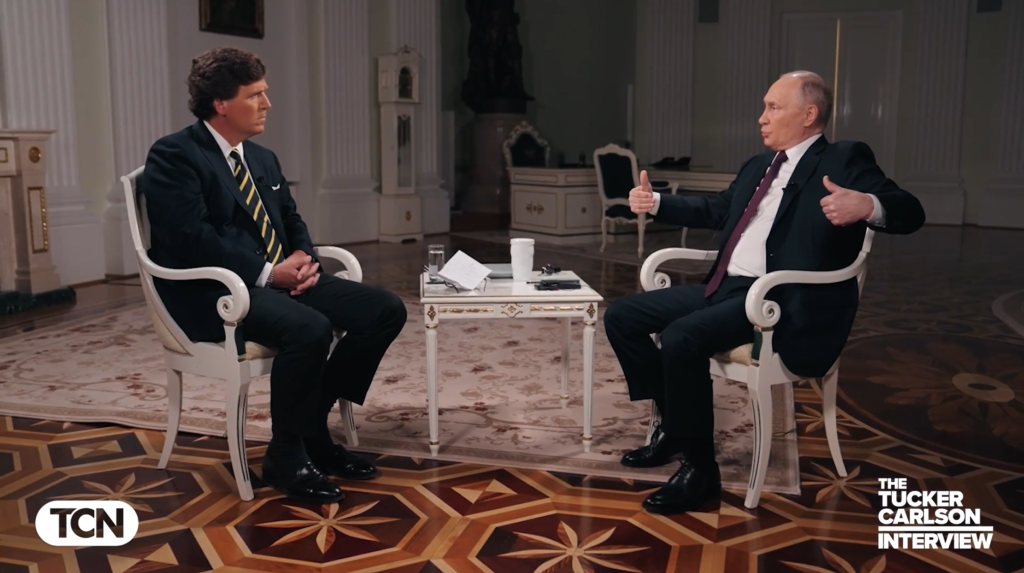Today, Tucker Carlson released perhaps the most important interview of our time—and one not sought by traditional, Western news media outlets, if I correctly understand things. Recorded on Feb. 6, 2024, the journalist sat with Russian President Vladimir Putin.
My wife and I watched the first 55 minutes of the more than 2 hour interview; we will finish it tomorrow. My interest: Context and record-setting straight by Putin and the questions Carlson poses. The liberal American news media cannot be trusted to get the facts—for reason nobody openly discusses, because maybe for fear of being called homophobic. Sharpen your nasty labels, baby, and let’s get to it.
Ahead of the Sochi Olympics in February 2014, Russia banned so-called “gay propaganda”, particularly related to minors. The law could be applied to foreigners, who could be jailed (for as many as 15 days), fined, and/or deported. The LGBQ+-friendly U.S. news media exploded with criticism and (somewhat) legitimate concerns about foreign athletes, family, fans, and journalists being arrested for their sexual orientation, while attending the Olympics.
Not coincidentally, the tone of news reporting about Putin, Russia, and the Winter Olympics turned quite nasty. Can you say biased? Reporters are supposed to check their subjective values at the door, but that’s far from their actions, starting summer 2013 and going through February 2014 and beyond. For additional perspective I recommend “Distorting Russia“. Dek: “How the American media misrepresent Putin, Sochi and Ukraine”; by Stephen F. Cohen, The Nation, Feb. 12, 2014.
My assessment remains the same a decade later: Anti-Russian rhetoric from the American government and the news media is largely rooted in Russian cultural values and public policies prohibiting or restricting behavior that the LGBQ+ crowd expects in the West and wants to spread everywhere else.
I make no value judgments but state facts. Actually, the people writing negatively about Russia are the ones making value judgments. That extends to gushy reporting about Ukraine, and not just since Russia’s invasion two years ago on February 24. The Ukraine lovefest goes back to February 10 years ago, when what Putin calls a “coup” occurred. In the interview, he blames U.S. instigation and participation, which was also my assessment when it happened.
We haven’t finished watching the interview, and I am interested to see if Putin mentions what made Russia’s response muted in 2014, when Ukraine’s government dramatically and suddenly changed: The Olympics were underway, and the global light already shown negatively upon his country. But he did assert the war didn’t start in 2022 by Russia’s invasion but by the coup 10 years ago. By Putin’s assessment, he acts to end the war.
Wow. That’s perspective, whether or not you agree with Putin’s statement or the military incursion. Because: Where else has that, and other insights about Putin and his motives, come to the American populace—unfiltered—other than this interview?
The interview posted at 6.p.m. EST. On YouTube, there are already 2.7 million views. On X (ya know, Twitter): 61 million, but I can’t say that number means more than casual versus watching the full two hours. Nevertheless, these two platforms show the amount of interest in an interview with Putin.
The Fourth Estate is supposed to reveal the truth for the benefit of the public interest. But traditional news media has failed its calling by falling into a pit of editorialization and holier-than-thou subjectivity. From the remains rises the Fifth Estate, from which Tucker Carlson emerges following his unexpected firing from Fox News in April 2023. We need more journalists who are willing to report what they know to be true—and from their own original news gathering—even when they are offended by the country, people, or topics.
The Featured Image is a screenshot from the interview.
